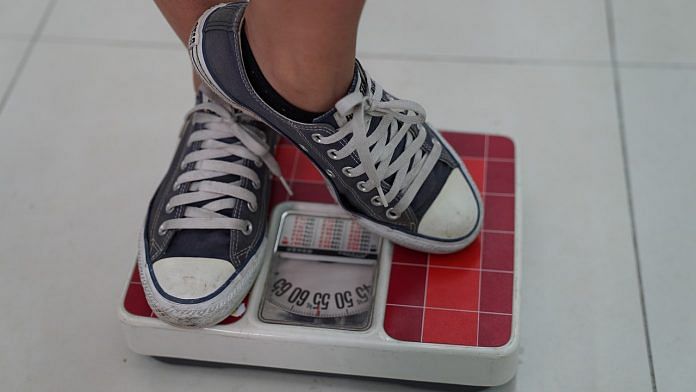New Delhi: Watching your calorie intake does little to help shed weight, reveals a study published Monday in the American Journal of Clinical Nutrition.
The ‘obesity epidemic’ is actually a result of the consumption of processed foods that fundamentally change the body’s metabolism, driving fat storage and obesity, the scientists said, refuting the established theory that suggests that overeating causes obesity.
So far, weight management approaches are based on the century-old energy balance model which states that weight gain is caused by consuming more energy than we expend. However, it is obesity that leads to overeating, and not the other way round, the research has shown.
According to the study, ‘The carbohydrate-insulin model: A physiological perspective on the obesity pandemic’, lead author David Ludwig said the energy balance model does not help us understand the biological causes of weight gain.
“During a growth spurt, for instance, adolescents may increase food intake by 1,000 calories a day. But does their overeating cause the growth spurt or does the growth spurt cause the adolescent to get hungry and overeat?,” Ludwig, an endocrinologist at Boston Children’s Hospital and Professor at Harvard Medical School, said in a press release.
Also read: How Covid ‘downsized’ India’s influenza problem & why experts say it’s not good news yet
Highly processed carbs the main culprit
Heavily marketed, low-cost processed foods along with increasingly sedentary lifestyles, are often thought to be the culprit behind the obesity epidemic.
On the other hand, despite decades of public health messaging, rates of obesity and obesity-related diseases have steadily risen, the authors say.
In the piece published in the Journal, researchers argue that the carbohydrate-insulin model better explains obesity and weight gain.
This model blames excessive consumption of foods such as processed, rapidly digestible carbohydrates that quickly increase blood sugar levels. These foods cause hormonal responses that fundamentally change our metabolism, driving fat storage, weight gain, and obesity, researchers said.
According to the team, eating highly processed carbohydrates leads to an increase in insulin secretion and a decrease in glucagon secretion. Both insulin and glucagon are hormones involved in controlling blood sugar (glucose) levels.
These hormonal changes signal fat cells to store more calories, leaving fewer calories available to fuel muscles and other metabolically active tissues. As a result, the brain is tricked into thinking that the body is not getting enough energy making a person feel more hungry.
In addition, metabolism may slow down in the body’s attempt to conserve fuel. Thus, we tend to remain hungry, even as we continue to gain excess fat.
The researchers thus say that it is not enough to consider how much one is consuming, but also how the foods one eats affect our hormones and metabolism.
With its assertion that all calories are alike to the body, the energy balance model misses this critical piece of the puzzle in the discourse around obesity.
Switching to the adoption of the carbohydrate-insulin model over the energy-balance model has implications for weight management and obesity treatment. Rather than urge people to eat less, the carbohydrate-insulin model suggests another path that focuses more on what we eat.
According to Ludwig, “Reducing consumption of the rapidly digestible carbohydrates that flooded the food supply during the low-fat diet era lessens the underlying drive to store body fat. As a result, people may lose weight with less hunger and struggle.”
The authors acknowledge that further research is needed to conclusively test both models.
(Edited by Paramita Ghosh)
Also read: How artificial cells could gobble up bacteria, deliver medicines



